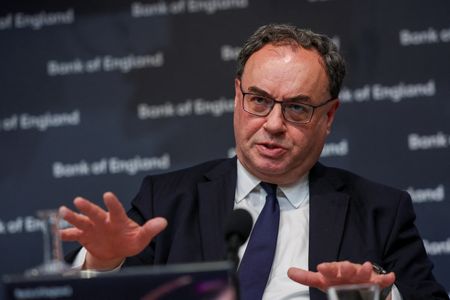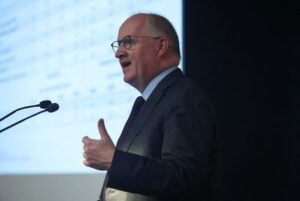By David Milliken and Andy Bruce
LONDON (Reuters) -Bank of England Governor Andrew Bailey said on Monday the British central bank had to “see the job through” on bringing down an inflation rate that is running higher than in any other major rich economy.
Bailey, under pressure from politicians and some economists over the surge in inflation, said price growth had proved to be stickier than the BoE had expected.
“It is crucial that we see the job through, meet our mandate to return inflation to its 2% target and provide the environment of price stability in which the UK economy can thrive,” Bailey said in the text of a speech he was due to deliver later on Monday to finance executives at London’s Mansion House.
Bailey’s comments largely echoed previous remarks which have convinced investors that more interest rate hikes are coming.
Interest rate futures on Monday pointed to a peak in Bank Rate of between 6.25% and 6.5% in early 2024 which would be the highest in 25 years and up from 5% now.
The BoE has raised rates at each of its past 13 meetings. Bailey said “some” of that tightening was yet to be felt as mortgage-holders gradually have to refinance.
While Britain’s economy had barely grown in comparison with its pre-pandemic level, Bailey said there had been unexpected resilience in the labour market and a recession had been avoided so far.
“This is a good thing in many ways. No one wishes to see unemployment higher or growth weaker,” Bailey said.
But this had also resulted in stronger inflationary pressures, he added.
BoE officials are closely watching data from the labour market and on services price inflation ahead of their next policy announcement on Aug. 3, Bailey said.
“Both price and wage increases at current rates are not consistent with the inflation target,” Bailey said. “Currently at 8.7% in the latest data, consumer price inflation is unacceptably high, and we must bring it down to the 2% target.”
Bailey used most of his speech to address issues around rules for Britain’s financial sector.
He said the BoE was reviewing a record 50,000 responses to its public consultation on a potential central bank digital currency, before a joint decision with the finance ministry on whether to go ahead.
Bailey said the aim was to provide a digital equivalent to cash rather than require the public to rely entirely on services provided by banks or other companies for online payments.
The BoE wanted to preserve the current mix of sources of money in the economy rather than allow banking services provided by the BoE to supplant those of commercial banks, he added.
“I don’t think we should be using enhanced digitalisation materially to shift the mix of commercial bank and central bank retail money towards the latter,” Bailey said.
He also said more clarity was needed for bank depositors about what would happen to savings above the 85,000 pounds ($109,000) which are currently guaranteed in the event of a bank collapse, like that of Silicon Valley Bank this year.
“It should be no surprise that the authorities are thinking carefully about this issue. It doesn’t automatically mean all money is guaranteed, but we must ensure the rules keep up to date,” Bailey said.
(Reporting by David Milliken and Andy BruceEditing by William Schomberg and Christina Fincher)





